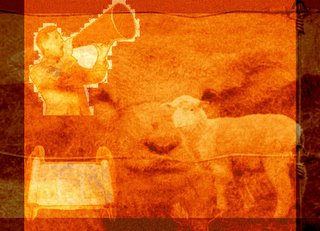 It's hard to believe, but this is the final week of the Psalm 119 Meditation. I'm not sure what will be next...
It's hard to believe, but this is the final week of the Psalm 119 Meditation. I'm not sure what will be next...vv. 169-176
WEEK: 1 2 3 4 5 6 7 9 10 11 12 13 14 15 16 17 18 19 20 21
November 9: Verse 176--"I have gone astray like a lost sheep; seek your servant, for I do not forget your commandments." I like the way the psalmist ends. He is honest about himself; he has gone astray AND he does not forget God's commandments. These are not opposites. I think that we think they are opposites. We think that if we--or 'they'--only knew God's Word, then we/they would not behave this way or that way. Nuh-uh. The psalmist remembers and he still messes up. His solution is very instructive. He prays that God would seek him. Wait. Aren't we supposed to seek God? Yup. But often--very often--lost sheep, though seeking, cannot find unless the shepherd seeks them. And he will seek. Our asking shows we want to be found. It shows that we really do remember his Word even though we've messed up. Great ending.
November 8: Verse 175--"Let my soul live and praise you, and let your rules help me." This verse echoes verse 174, but what is different is the change to prayer and the connection of life and praise. The psalmist here connects his very life with praise, as if worship were his purpose. But then, I'm thinking that is his point in this psalm. Life changes. Stuff comes and goes. Enemies rise and fall. Friends come and go. God remains. God's word remains. Our connection to him remains, for he will not let go.
November 7: Verse 174--"I long for your salvation, O LORD, and your law is my delight." Yesterday, during his sermon on praying with understanding (see notes here), the pastor shared that, as he was walking and praying (as is his habit), out of left field came a statement--You have lost your first love. Like Pastor Charlie, I think I have lost my first love (see Rev 2:1-7). Seminary is amazing, but it tends to make one believe that homework about God and God's things is the same thing as spending time longing for and delighting in God. Given that the presures of seminary will continue into the next degree (Master of Theology, starting in Spring 2006), I must learn to make space in my life for Sabbath--time to long for God and delight in God. Even though I spend non-homework time nearly everyday, reading and praying, there is little time to sit and be with God. I'm not quite sure where or how to put this in, but it is necessary. Loving God is more important than merely knowing about him.
November 6: Verse 173--"My tongue will sing of your word, for all your commandments are right." Singing here is a response to the rightness of the word. Too often, I think, we connect singing to emotions. What would happen if we really made it a point to understand the truth of God's Word? To understand the rightness of it?
November 5: Verses 171-172--"My lips will pour forth praise, for you teach me your statutes. My tongue will sing of your word, for all your commandments are right." God's statues and commandments give us a vocabulary for praise.
November 4: Verses 169-170--"Let my cry come before you, O LORD; give me understanding according to your word! Let my plea come before you; deliver me according to your word." Sometimes life stinks. Reading Chris Seay's remembrance of Kyle Lake brought this to the front of my mind. I did not know Kyle. His family, friends, and congregation are in severe pain right now. They want God to hear. They want God to explain. They want God to make it right. This is the psalmist's cry, here in these two verses and interspersed throughout this psalm--and many of the psalms. Sometimes God gives us neither understanding or deliverance--at least not the of the comforting temporal variety. Sometimes we spend an entire lifetime not understanding a tragedy and yet having to deal with its consequences. What makes it possible for a God-follower to live like that? Knowing the truth about who God is--knowing that at the end of it, God is good and God is powerful...even though we may not understand...even though we may not be delivered.
November 3: This picture attempts to sum up the psalm. The psalmist cries out to God for help. The psalmist rests on God's Word. Finally, the psalmist is a sheep in God's flock--he is protected and cared for.
All verses are quoted from the ESV.
No comments:
Post a Comment